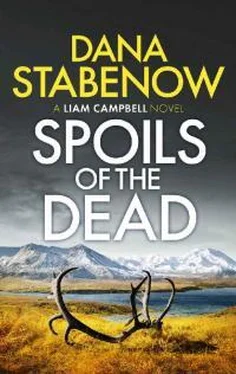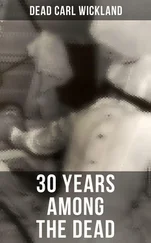“Thank you, Ms. Petroff.” He sat down again. She picked up his phone and handed it to him. “Please enter your passcode, sir?”
“Certainly.” He did and handed the phone back.
She tapped away industriously and set it back down on the desk. “‘Post’ rings the landline on my desk. ‘SP’ is my cell number.”
“Thank you,” he said again, and studied her for a moment. She was of medium height but her erect posture made her seem taller. She was dressed in a neat two-piece pantsuit in dark blue with a white button-down underneath. She wore small silver hoops in her ears, no watch, no rings. Her nails were cut straight across and unpolished. She was very nearly a case study in professional anonymity. “You studied in Anchorage, you say?”
“Yes, sir.”
“And then worked at HQ for a year.”
“Yes, sir.”
“When did you move back down to the Bay?”
“A month ago. When they finished the post.”
“Have you found a place to live?”
“Yes, sir. A mother-in-law apartment over a garage. It’s only a studio but very comfortable.”
“Your landlord okay?”
“Yes, sir. It’s my uncle’s wife’s sister and her husband. They fish commercially during the summer and grow coffee in Hawaii in the winter.”
“Nice.” He looked up. “Is there anything in particular you’d like to draw my attention to, Ms. Petroff? Since you got here before me and have had time to settle in.”
She hesitated, and he wondered if her advice had never before been solicited by a trooper. If her time on the job had been spent only at HQ, she would have seen more of politics than of policing, so perhaps not a surprise. “If you read through the last month’s dispatches for this detachment, sir, it will do much to bring you up to speed. I…”
“Yes?” he said encouragingly.
“I believe Chief Armstrong would welcome an introduction, sir.”
He nodded. “Anything else?”
“There’s a local paper, sir, a weekly. It has a section called Cops and Courts. It would also help bring you up to speed.”
That’s right, they had an actual judge here in Blewestown; an actual judge in an actual courtroom in an actual courthouse. With jury trials. Which meant juries. God. “Should I introduce myself to the local judge as well?”
She nodded. “Yes, sir. I doubt that either of you want to meet for the first time in court.”
He’d rather never meet another judge again as long as he lived. He wanted Bill back. Magistrate Bill Billington had taken no prisoners. She’d been a damn fine bartender, too. “No, probably not.” He looked at the screen. “Why don’t you call Chief Armstrong and ask him if he’s free for lunch? Tell him to pick the restaurant.”
“Very good, sir.” She turned to leave.
“Ms. Petroff?” She looked over her shoulder. “Were either of your parents in the military?”
“No, sir?”
“Just a passing thought.” He waved her away and clicked on the dispatch icon she had so helpfully and efficiently set up on his desktop, and plunged into the minutiae of a state trooper’s life on the road system.
The phone on his desk beeped. “Yes?”
“Chief Armstrong says to meet him at noon at the Compass Rose Diner.”
“Thank you, Ms. Petroff.”
“And Judge DeWinter says she is free at three, if you’d care to meet her in her office then. She says please will you bring the coffee.”
“I trust you know how she likes it, Ms. Petroff? And where to buy it?”
“Of course, sir.”
“Then please tell the judge I’ll see her then, and thank you again.”
“You’re welcome, sir.”
Liam grinned at the door. For once in his life and, Liam was certain, entirely without intending to do so, it looked like Barton had done Liam a honking big favor.
Seven
Tuesday, September 3
HE RETURNED FROM LUNCH IN A thoughtful mood and sat in his truck outside the post for a few moments, reviewing the meeting just past. The Blewestown chief was in his mid to late fifties, bulky but not fat, head shaved, dark blue uniform all present and correct. He greeted the waitstaff by name; they in turn called him “Chief” or “Chief Armstrong” and were polite but not friendly.
To Liam, the chief was polite but not genial. When asked, he revealed that he’d lived in Blewestown all his life bar four years in the Marines. He revealed that he was still in the reserves and had seen time in the Sandbox, not a full tour, no, but active service. His parents had been commercial fishermen and he had been a drifter himself and fished across the Bay when his off time coincided with an opener. He was divorced with two children, both out of college, one an LPN at the local hospital, the other a biologist with the Alaska Department of Fish and Game in Anchorage.
“You’re out of uniform,” he said before Liam’s butt had even hit the seat of his chair.
“It’s being shipped,” Liam said, and tried not to feel annoyed.
Armstrong answered Liam’s questions directly, usually in simple declarative sentences. He didn’t ask the same questions of Liam. Either he didn’t care or he already knew, probably the latter. Liam was just a tad notorious in Alaska law enforcement, but Armstrong made only one remark that acknowledged that. “I followed the Gheen case.”
Liam waited.
“I’m acquainted with Nina Stewart’s family.”
It took Liam a moment to remember. Nina Stewart had been Rebecca Hanover’s staunch best friend. “I remember her on the news.”
“Yeah, you don’t fuck with Nina.” Without changing expression or added emphasis, Armstrong said, “You should have killed the son of a bitch.”
Liam swallowed the rage that rose every time someone said that to him. Many had. “I’m a state trooper, not an executioner.”
The air cooled even further. Lunch arrived—okay burgers and soggy fries—and they ate without commentary. Afterward, Armstrong worked a toothpick around his teeth and said, “We haven’t had a trooper assigned here for decades. Usually your people are dispatched out of Soldotna. If we need them.”
The implication being they didn’t. Liam had wondered if he was about to be handed his hat and shown the door, metaphorically at least, and waited warily. Usually local law enforcement in Alaska was ecstatic for any kind of help, but Blewestown was on the road system and one of the state’s larger communities, which bred a larger and more autonomous police department, mostly because it was easier to get help. It took something extra to live and work in the Bush; it took nothing extra to live and work on the road system. “I’m aware,” he said.
The chief nodded. “Our area of responsibility only extends to the city limits. You, on the other hand, are responsible for everything that happens on the other side of those limits.”
“Well.” Liam tried a smile. “Not everything, I hope.”
The chief did not smile back. “There are three Old Believer villages. They’re pretty self-sufficient. They almost never call in. But there are an awful lot of people living out in the boonies who could use a little attention.”
“I am aware,” Liam said again.
“You’ll need a four-wheeler.”
“I’m told I’ll have one, and a pickup with four-wheel drive.”
The chief nodded. “A plane?”
“I don’t fly.”
“You’ll need a pilot on call then.” He jerked his head toward the view of the other side of the Bay, visible outside the window they were sitting next to. “Those folks generally keep themselves to themselves but they do need help on occasion.”
Please god not too often, Liam thought.
“We should exchange phone numbers,” the chief said. They did, and the chief picked up his hat.
Читать дальше












